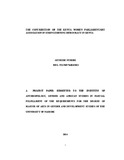| dc.description.abstract | This was a cross-sectional study on the contribution of the Kenya Women
Parliamentary Association (KEWOPA) to strengthening democracy in Kenya.
Specifically, the study sought to describe the extent to which KEWOPA has
strengthened democracy and identify the challenges KEWOPA has faced in its
endeavours to strengthen democracy in Kenya. This study was guided by the theory of
liberal feminism whereas data were collected through in-depth interviews and key
informant interviews.
The study findings indicate that the caucus serves to consolidate the agenda of women
and becomes the platform upon which strategic role in changing legislation, boosting
general welfare and serves to amplify women’s voices. This conception is manifested
in the gender-aware legislations drafted and moved by KEWOPA members, the
welfare and reproductive health advocacy projects initiated in the communities and
the consultative approach exhibited by women leadership in their constituencies
which remain significant values of democracy. On the other hand, feminization of the
caucus’ work by male parliamentarians, the numerically dismal number of women
relative to men thus disadvantaging their voting power in parliament as well as
committee leadership representation, low technical capacity in navigating the
institution of Parliament with Bills, dependence on donor-funding to facilitate their
activities, political party differences in terms of priorities and subsequent membership
allegiances, are amongst challenges facing KEWOPA.
The study concludes that the Women Parliamentary Caucus has played and continues
to play a significant role in the democratic process in Kenya. The approaches used by
the caucus, amongst them legislation, parliamentary leadership, institutionalization of
gender lenses in resource allocation, parliamentary language and its norms and in the
vii
whole question of representational politics have been lauded in the study as indicators
of women’s contribution to the principle of equity and equality in democratic
governance. The study, therefore, recommends that members of KEWOPA should be
empowered through capacity building. | en_US |



